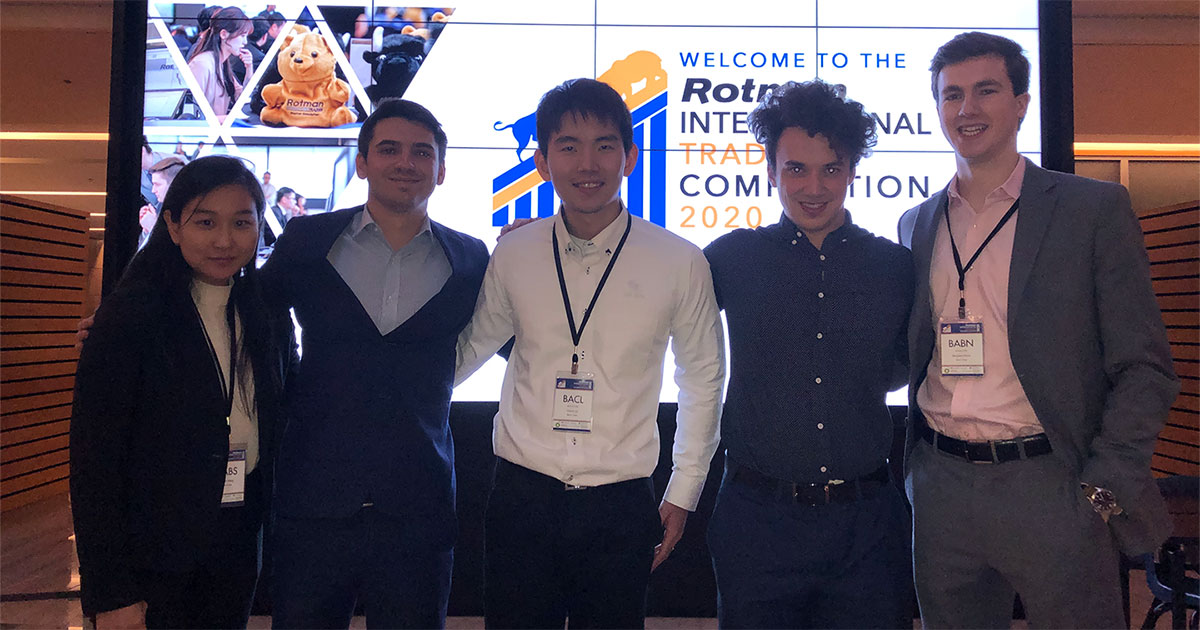Taking Trading Strategies to Toronto

As the names of the top-placing teams were called on the final day of the 2020 Rotman International Trading Competition (RITC), the Babson Trading Team found itself becoming more and more elated.
Anticipation skyrocketed when the team continued to not hear their name as the top 10 was announced—from ninth to eighth, seventh to sixth, and fifth place.
Finally, they heard it: Fourth place out of 47 teams of top finance students from around the world. The Babson students were ecstatic.
“Trading is the most beautiful culmination of intelligence and competition in the world,” said Ben Norris ’21. “It gives you that rush. When you hear NFL players talking about that rush they get coming out of the tunnel, it’s the closest we can come to it.”
Hours of Preparation
What made this team special? According to professor and team advisor Ryan Davies, it’s the effort. From September to February, he estimated the team spent 100 hours practicing.
“It comes down to their dedication,” Davies said. “There’s a lot of work to do to prep for the cases. It’s about putting in the time.”
In the weeks leading up to the competition, the team underwent a number of practice sessions inside the new Cutler Center finance lab using RITC software.
“That’s where teamwork is important,” Sarah Wang ’20 said. “We had to practice communicating with each other.”
Norris was studying abroad in Ireland at the time, and participated in practices via FaceTime Audio. When it was time to travel to Toronto for the competition, he flew in and met the team at the airport.
In the 2019 competition, Alex Spinnell ’20—who served as the team’s de facto captain this year—took the time to network with other teams and learn about their approach. Some of that information was implemented into the team’s 2020 strategy.
“It felt organized, there was a clear hierarchy,” Norris said. “Having a leader allows a team to rally behind somebody. You feel responsible.”
“Alex brought that fire, in the sense that he wanted the team to come back and do even better,” added Davies. “He got the team working hard, he kept everybody in line, everyone motivated.”
Joining the Team
Last year’s team finished ninth of 52 teams, Babson’s best overall finish since 2010. The three-day simulated market challenge brings students and advisors from around the world to participate in electronic and outcry trading cases, seminars with industry practitioners, and social events.
Skills required to compete can’t be learned in just a few months. In fact, joining the Babson Trading Team first requires enrolling in Trading Strategies and Risk Management, taught by Davies.
Instead of tests, academic performance is assessed through practice competitions. Students also familiarize themselves with RITC software, providing them with a foundation for potential future competitions.
Last fall, Babson hosted its own annual trading competition with more than 50 students. Spinnell previously won the competition and was a returning member of the 2019 team, while Norris won this year’s iteration and Wang finished just outside the top three.
The Trip and Competition
For Spinnell and the rest of the team, Davies’ class and their practice cases directly go back to its success.
“Once I took his class, I didn’t really think of it was work,” Spinnell said. “It was just fun, like playing a game.”
The feeling of finishing fourth overall was one Wang said she “couldn’t believe.”
“We outcompeted huge-name schools,” Norris said. “I jumped, I’m still speechless about it, it was so surreal.”
“It’s good to show that we succeeded and we’re pretty good at (this type of work),” Spinnell said.
Participating in the competition allowed members of the team to learn about different areas of trading that they wouldn’t have if not for a school like Babson.
“Babson organizes so many career trips,” Wang said. “It’s really helped me establish relationships with alumni doing well in the finance industry.”
Davies turned all the credit back to the team.
“It’s really a testament to the students. You (the advisor) can only motivate students so much, the motivation has to come from the inside.”
Posted in Community




